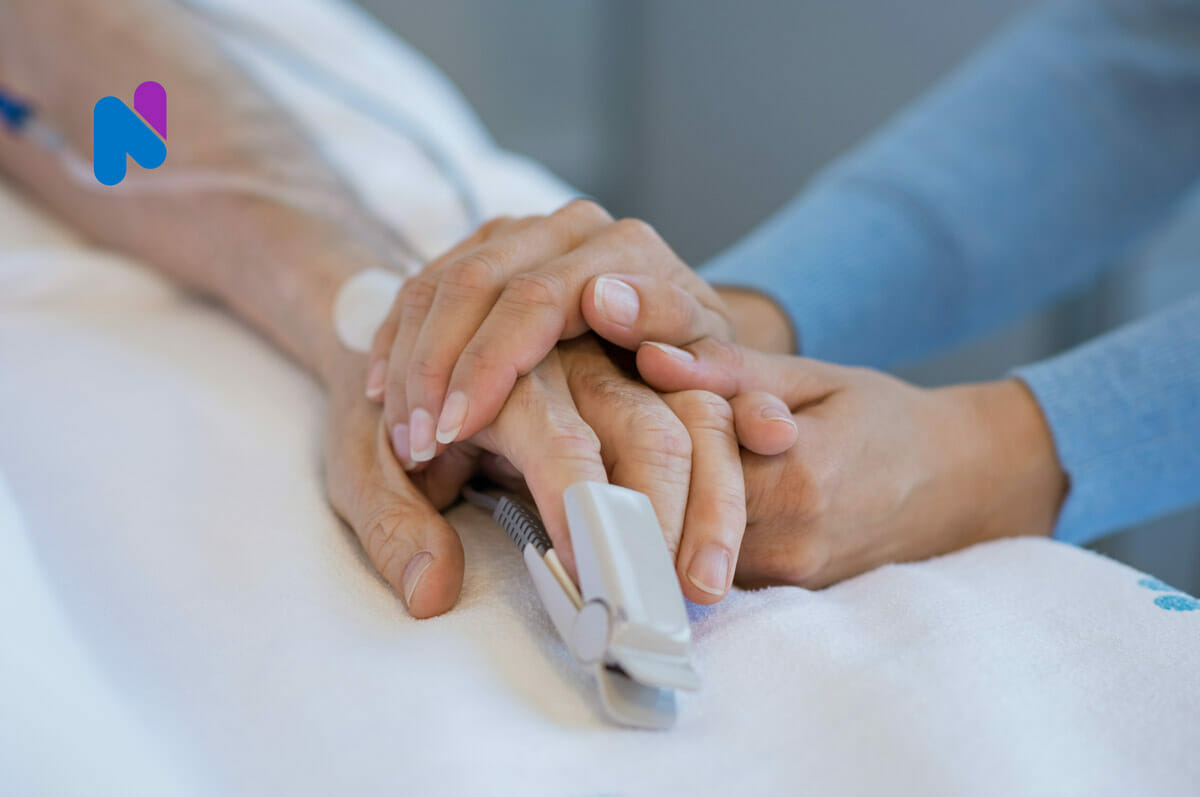Death is a natural part of life that an individual must go through. Medical professionals, including nurses, must provide care for people as they transition into this part of their life.
For some patients, it may be a tremendously sad and difficult part of their life. Others may be ready to pass because they are at peace with this transition.
Nurses often face the challenge of coping with patient loss, which can have a profound emotional impact on their well-being. Dealing with grief is an inevitable part of the nursing profession, and it’s crucial for nurses to understand the importance of addressing their emotions and developing healthy coping strategies.
This time can be stressful for patients and for the individuals working with them. Some nurses will encounter more patient deaths than others, depending on their area of specialization. It is much more common for an emergency room nurse or hospice nurse to see a patient pass away.
There are many things a nurse or any medical professional can do to cope with the loss of a patient.
First, let’s look a little further into how grief impacts us.
Understanding Grief
IN THIS ARTICLE
Nurses may experience a wide range of emotional responses when coping with patient loss, including sadness, anger, guilt, anxiety, and loneliness. There are many stages of grief.
It’s important to recognize that these feelings are natural and valid. Grief is often described as a journey, and nurses may go through various stages, such as denial, anger, bargaining, depression, and acceptance. However, it’s crucial to understand that grief is a highly individual experience, and there is no “right” or “wrong” way to grieve.
Nurses must allow themselves the space and time to process their emotions and acknowledge that their grieving process may differ from that of their colleagues or loved ones. It is a very human experience that we must accept.
The Importance of Self-Care

Self-care plays a vital role in helping nurses cope with the emotional toll of patient loss. Engaging in mindfulness practices, such as deep breathing, meditation, or journaling, can help nurses find moments of calm and clarity amidst the chaos of grief.
It’s essential for nurses to prioritize their physical and emotional well-being by maintaining a healthy work-life balance, getting enough rest, eating a balanced diet, and engaging in regular exercise.
By taking care of themselves, nurses can build the resilience and strength needed to weather the storms of grief and continue providing high-quality care to their patients.
Unfortunately, there is no one-size-fits-all approach to handling the death of a patient. We understand there are many personal factors.
However, there are certain strategies and coping mechanisms that we suggest.
If you are trying to cope with the loss of a patient, remember the following:
1. It’s Natural to Feel Grief
Do not keep emotions bottled up inside you. It is better to let them out and cry if need be.
Coping with death is a process. A medical professional should be open about their feelings. It is very natural to grieve, and everyone experiences it at one time or another in their life.
2. Manage Your Emotions

Nurses may find it challenging to manage their emotions when coping with patient loss, especially in the workplace.
It’s important to have techniques for regulating emotions, such as taking deep breaths, stepping away from a stressful situation, or practicing grounding exercises.
Nurses should also feel empowered to acknowledge and validate their feelings, rather than trying to suppress or ignore them.
If a nurse experiences triggers or emotional outbursts, it’s crucial to have a plan in place for managing these situations, such as seeking support from a colleague or taking a brief break. Remember, it’s okay to not be okay, and expressing emotions is a sign of strength, not weakness.
3. Speak to Colleagues and Friends
Much can be learned from colleagues and friends. Chances are, your medical team has been there, too.
They may have been in a similar state of mind or had an experience like yours during one point in time. Even just time with family and getting away can be beneficial.
From those experiences, they can give you advice on how they were able to cope with the loss of a patient. It may make you feel better to speak to someone who has gone through a similar experience as you.
If you feel that you need more help, a psychologist may be able to help you through the grieving process.
4. Seek Professional Support
Leaning on family and friends for emotional support and practical assistance can help nurses feel less alone in their grief, but healthcare institutions have a responsibility to provide resources and support systems for you, such as Employee Assistance Programs (EAPs), grief counseling, and support groups.
Nurses should take advantage of these resources and advocate for their own emotional well-being. Counselling services can be a wonderful opportunity to receive sound advice and clear coping strategies from a true professional.
5. Practice Mediation and Yoga
Meditation is used all across the world to bring about emotional clarity and a calm state of mind, especially during a difficult situation.
Both meditation and yoga have been found to reduce stress, pain, and depression. They also increase an individuals well being and consciousness.
6. Building Resilience

Resilience is like a muscle that nurses can strengthen over time to help them cope with future losses.
Building resilience is a long-term coping mechanism involves developing a toolkit of healthy coping strategies, such as:
1. Practicing self-compassion and kindness towards oneself
2. Cultivating a support network of trusted individuals
3. Engaging in hobbies and activities that bring joy and relaxation
4. Setting realistic expectations and boundaries
5. Reframing challenges as opportunities for growth and learning
By actively working on building resilience, nurses can enhance their ability to bounce back from adversity and maintain a sense of hope and purpose in the face of loss.
7. Addressing Moral Distress of Death of Patients
Moral distress can arise when nurses face ethical challenges related to patient loss, such as witnessing suffering, feeling powerless to alleviate pain, or questioning the appropriateness of care decisions.
Moral distress can contribute to feelings of guilt, anger, and frustration, compounding the emotional impact of grief. Nurses must recognize the signs of moral distress and take steps to address it, such as:
1. Engaging in open and honest communication with colleagues and supervisors
2. Seeking guidance from ethics committees or professional organizations
3. Advocating for policies and practices that align with ethical principles
4. Participating in debriefing sessions or support groups to process moral distress
By addressing moral distress head-on, nurses can mitigate its negative impact on their emotional well-being and maintain a sense of moral integrity in their work.
8. Exercise and Go Outdoors
Exercise reduces emotional and mental stress. It releases tensions that have built up over time.
Being outdoors is very refreshing to the mind and body. It is a critical part of human life and helps you reconnect with nature and get out from inside of your mind.
Sunlight is also known to improve an individual’s mood.
9. Take a Break or go on Vacation
When you’re feeling heavy nurse grief, a break is necessary at times if you feel like you can not give your full potential to your work after the loss of a patient.
Try not to work overtime or accept extra shifts, and take some time off. Speak to your nurse manager to see if setting up a schedule with fewer patients is possible.
10. Speak to the Patient’s Family (If They are Okay With It)

If you and the family are comfortable with each other, it may be a good idea to express your compassion for the loss of the patient.
This will help you remember the hard work you put into caring for the patient and may also give you some closure.
11. Don’t Search for Reasons
People get sick and pass away at different ages.
Do not try and reason with yourself as to why it happened. This could lead to you blaming yourself for the loss of a patient. Your nurse grief is bad enough, do not let the death of a patient make you question your character and skills.
Despite the tough situation, it is important that you keep a good attitude so that you can help the next patient to the fullest potential.
Medical professionals make their living caring for others. Patients range in all ages and backgrounds. Nurses must understand that a person will pass away at some point. Although difficult, it is especially important to keep your work attitude separate from personal feelings.
What are the Long-Term Effects of Unresolved Grief?
Unresolved grief can have significant long-term effects on nurses’ mental health and well-being. Nurses who do not adequately process their grief may be at higher risk for developing depression, anxiety, or post-traumatic stress disorder (PTSD).
The emotional burden of unresolved grief can also impact nurses’ ability to provide high-quality patient care, as they may struggle with concentration, decision-making, or emotional regulation.
Over time, the cumulative impact of unresolved grief can lead to burnout, compassion fatigue, and even the decision to leave the nursing profession altogether. It is crucial for nurses to prioritize their emotional health and seek help when needed to prevent the negative long-term consequences of unresolved grief.
Prioritize Self Care After the Death of a Patient
Coping with loss is an inherent part of the nursing profession, but it is not a journey that nurses must undertake alone.
By prioritizing self-care, seeking support, building resilience, managing emotions, finding meaning and purpose, addressing moral distress, and accessing available resources, nurses can navigate the difficult terrain of grief with greater ease and grace. Healthcare institutions also have a vital role to play in creating a supportive and compassionate work environment that recognizes and addresses the emotional impact of patient loss on nurses.
As nurses, we must remember that our capacity for empathy and compassion is not a liability, but a gift that allows us to provide the highest quality care to our patients and their families.
By tending to our own emotional well-being with the same dedication and skill that we bring to our clinical practice, we can continue to find joy, meaning, and fulfillment in the vital work that we do.
If you have experienced loss as a nurse, take the time to consider whether or not you are easily affected by death. Do not let the memory of the deceased patient haunt you, so to speak.
You may want to consider choosing a specialty around this, as some fields will experience death more than others.
If you are an RN or LVN interested in job opportunities, visit NurseRegistry’s job board.
Frequently Asked Questions about Coping After a Patient Dies
What strategies can nurses employ to manage feelings of guilt after a patient’s death?
Nurses can manage feelings of guilt by acknowledging that death is a natural part of life and that they did everything they could to provide the best possible care for their patients. They can also seek support from colleagues, supervisors, or mental health professionals if needed. Practicing self-care, such as exercise, meditation, or talking to loved ones, can also help alleviate feelings of guilt.
What are effective ways for nurses to process grief following the loss of a patient?
Effective ways for nurses to process grief include seeking support from colleagues, friends, family, or mental health professionals. They can also participate in debriefing sessions or support groups to discuss their emotions and feelings. It is essential for nurses to take time to grieve and practice self-care, such as engaging in hobbies, spending time with loved ones, or taking time off work.
How can nurses support each other in coping with the emotional impact of patient death?
Nurses can support each other by providing a safe and supportive environment to discuss their emotions and feelings. They can also participate in debriefing sessions or support groups to share their experiences and receive emotional support. Nurses can also offer practical support, such as helping with workload or providing coverage for colleagues who need time off.
What is the role of a nurse in the immediate aftermath of a patient’s death?
The role of a nurse in the immediate aftermath of a patient’s death includes providing emotional support to the patient’s family and loved ones. Nurses can offer condolences, answer questions, and provide information about the patient’s care. They can also assist with practical matters, such as contacting the appropriate authorities or arranging for transportation of the body.
How can nurses balance professional responsibilities with personal emotions during patient loss?
Nurses can balance professional responsibilities with personal emotions by acknowledging that it is normal to feel emotions after a patient’s death. They can practice self-care, such as taking breaks, engaging in hobbies, or seeking support from colleagues or mental health professionals. Nurses can also communicate with their supervisors or colleagues about their emotional needs and work together to find solutions.
What resources are available for nurses seeking assistance with grief and loss?
Resources available for nurses seeking assistance with grief and loss include Employee Assistance Programs (EAPs), counseling services, support groups, and mental health professionals. Nurses can also seek support from their colleagues, supervisors, or spiritual leaders. It is essential for nurses to know that seeking help is a sign of strength, and there is no shame in asking for assistance.





